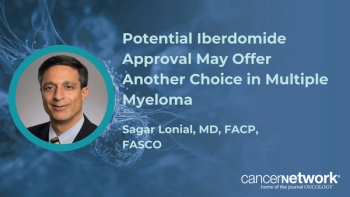
Guidelines for Treatment of Multiple Myeloma-Related Bone Disease Released
The International Myeloma Working Group recently released new recommendations to aid physicians in the treatment of bone disease related to multiple myeloma.
The International Myeloma Working Group (IMWG) recently released a set of recommendations to aid physicians in the treatment of bone disease related to multiple myeloma. The guidelines incorporate new data from studies through August 2012 and update recommendations for the use of bisphosphonates, zoledronic acid, and other treatments.
A panel of experts in the field of multiple myeloma and myeloma-related bone disease worked to develop
“Several novel data that were published during the last 5 years by the MRC-IX study group and others have changed the landscape of the management of myeloma-related bone disease and, thus, the IMWG should publish novel guidelines for the myeloma-treating physicians,” said Evangelos Terpos, MD, PhD, lead author on the guidelines and assistant professor of hematology at the University of Athens School of Medicine, Greece.
“The guidelines aim to help physicians to better manage myeloma patients with bone disease and also to help them prevent skeletal-related events that deteriorate the quality of life of myeloma patients, but also to prevent the side effects of the drugs used,” he told Cancer Network.
Among the recommendations detailed in the paper are several new guidelines discussing the appropriate patient population and choice of bisphosphonates. First, the panel recommended that bisphosphonates be considered in all patients with multiple myeloma receiving front-line anti-myeloma therapy regardless of the presence of osteolytic bone lesions on conventional therapy.
“However, it is unknown if bisphosphonates offer any advantage in patients with no bone disease assessed by low-dose whole body CT, MRI, or PET/CT,” Dr. Terpos said.
Second, the panel recommended that zoledronic acid be the preferred treatment over oral clodronate in newly diagnosed patients. This is recommended based on zoledronic acid’s potential anti-myeloma effects and survival benefits.
“Zoledronic acid is the only bisphosphonate shown to increase survival in the whole studied population of a prospective randomized trial,” the panel members wrote.
In addition, zoledronic acid was found to improve overall survival and reduce skeletal-related events compared with clodronate in patients who received treatment for more than 2 years. Therefore, the panel recommended that zoledronic acid be administered until disease progression in patients not in complete remission or a very good partial remission and further continued at relapse.
In contrast, no similar evidence was found for pamidronate; pamidronate should be continued in patients with active disease at the physician’s discretion.
“For patients in complete remission/very good partial remission, the optimal treatment duration of bisphosphonates is not clear; the panel agrees that bisphosphonates should be given for at least 12 months and up to 24 months, and then at the physician’s discretion,” Dr. Terpos said. “All previous guidelines suggested the 2-year duration of bisphosphonates in newly diagnosed myeloma patients.”
Finally, the panel recommended that balloon kyphoplasty should be considered for symptomatic vertebral compression fractures and is the procedure of choice to improve quality of life in patients with painful vertebral compression fractures. According to the panel, the role of vertebroplasty for myeloma patients is less clear as there is no randomized trial of vertebroplasty in myeloma patients.
Newsletter
Stay up to date on recent advances in the multidisciplinary approach to cancer.



















































